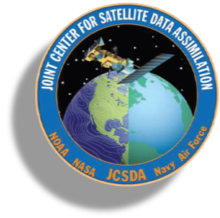This week JCSDA’s Eric Lingerfelt gave a 20 minute talk at the International Conference on Computational Science in Malaga, Spain. He presented the Research Repository for Data and Diagnostics (R2D2) component of the Joint Effort for Data Assimilation (JEDI) in the conference’s thematic track “Advances in High-Performance Computational Earth Sciences: Numerical Methods, Frameworks & Applications”.
CRTM to Work With Upcoming NASA PolSIR Mission
The Polarized Submillimeter Ice-Cloud Radiometer (PolSIR) is an upcoming NASA satellite mission scheduled for launch in 2027, designed to study the elusive role of ice clouds in Earth’s weather and climate systems. In support of this innovative satellite mission, the PolSIR sensor will be simulated by the Community Radiative Transfer Model (CRTM).
Showcasing the Assimilation of TEMPO NO2 Data in the JEDI System with the GEOS-CF Model
In a recent collaborative effort between the Joint Center for Satellite Data Assimilation (JCSDA) and the Global Modeling and Assimilation Office (GMAO), we have successfully integrated the newly released Level 2 TEMPO NO2 products into the JEDI data assimilation system using the GEOS-CF model at C360/~25km resolution (the background and the analysis are at the same resolution). This initiative demonstrates the enhanced capability to monitor and produce analyses of atmospheric composition less than 24 hours after official product release, focusing on NO2, a significant pollutant and tracer for air quality.
Recent Fixes in JEDI Making a World of Difference
JCSDA's Q4 Review Highlights Exciting Progress Across All Teams
On April 18 the JCSDA team met with our partners at NASA, NOAA, US Navy, US Air Force, and the UK Met Office to celebrate the last quarter of accomplishments and discuss goals for the upcoming quarter and AOP year. Q4 accomplishments included several important bugfixes, new sensors, and several experiments added to SkyLab v8!
JCSDA's Cheng Dang Accompanies UCP Directors on Visit to Utah Universities
Earlier this month JCSDA’s Cheng Dang joined Bill Kuo, UCP Director, and Mohan Ramamurthy, Director of EODS Center and Unidata, on a four day visit to Utah State University and the University of Utah. Along with presentations and seminars about JCSDA for the students, they met with faculty using JEDI and data assimilation in their own research.
Joint NASA/JCSDA Code Sprint Greatly Increases R2D2 Sustainability
JCSDA Announces Eighth Public Release of Skylab
JCSDA’s 2023 Q3 Review Shows Exciting Progress
On Thursday, January 25, the JCSDA core team and partners from NOAA, NASA, U.S. Navy and Air Force, and the UK Met Office met virtually and in-person to review accomplishments from the last three months and discuss future goals. This quarter saw a lot of functionality added to SkyLab with the release of SkyLab v7, two spack-stack releases, numerous additional sensors, and much more!
JCSDA Announces Seventh Public Release of Skylab
The JCSDA is pleased to announce the release of Skylab 7.0!
JCSDA SkyLab 7.0 is the seventh roll-up release that provides integrated Earth System Data Assimilation capability. All JEDI code is open source and publicly available at https://github.com/JCSDA. Capabilities are demonstrated via the SkyLab testbed experiments conducted internally at JCSDA for the following components











